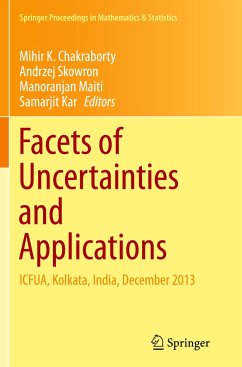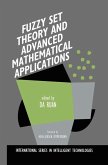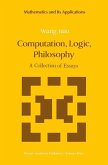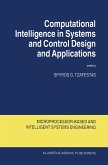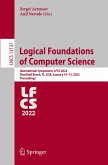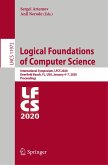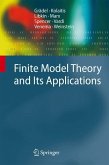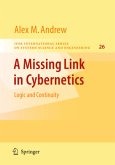Facets of Uncertainties and Applications
ICFUA, Kolkata, India, December 2013
Herausgegeben:Chakraborty, Mihir K.; Skowron, Andrzej; Maiti, Manoranjan; Kar, Samarjit
Facets of Uncertainties and Applications
ICFUA, Kolkata, India, December 2013
Herausgegeben:Chakraborty, Mihir K.; Skowron, Andrzej; Maiti, Manoranjan; Kar, Samarjit
- Broschiertes Buch
- Merkliste
- Auf die Merkliste
- Bewerten Bewerten
- Teilen
- Produkt teilen
- Produkterinnerung
- Produkterinnerung
Since the emergence of the formal concept of probability theory in the seventeenth century, uncertainty has been perceived solely in terms of probability theory. However, this apparently unique link between uncertainty and probability theory has come under investigation a few decades back. Uncertainties are nowadays accepted to be of various kinds. Uncertainty in general could refer to different sense like not certainly known, questionable, problematic, vague, not definite or determined, ambiguous, liable to change, not reliable. In Indian languages, particularly in Sanskrit-based languages,…mehr
Andere Kunden interessierten sich auch für
![Fuzzy Set Theory and Advanced Mathematical Applications Fuzzy Set Theory and Advanced Mathematical Applications]() Fuzzy Set Theory and Advanced Mathematical Applications121,99 €
Fuzzy Set Theory and Advanced Mathematical Applications121,99 €![Computation, Logic, Philosophy Computation, Logic, Philosophy]() Wang HaoComputation, Logic, Philosophy81,99 €
Wang HaoComputation, Logic, Philosophy81,99 €![Computational Intelligence in Systems and Control Design and Applications Computational Intelligence in Systems and Control Design and Applications]() S.G. Tzafestas (Hrsg.)Computational Intelligence in Systems and Control Design and Applications81,99 €
S.G. Tzafestas (Hrsg.)Computational Intelligence in Systems and Control Design and Applications81,99 €![Logical Foundations of Computer Science Logical Foundations of Computer Science]() Logical Foundations of Computer Science58,99 €
Logical Foundations of Computer Science58,99 €![Logical Foundations of Computer Science Logical Foundations of Computer Science]() Logical Foundations of Computer Science39,99 €
Logical Foundations of Computer Science39,99 €![Finite Model Theory and Its Applications Finite Model Theory and Its Applications]() Erich GrädelFinite Model Theory and Its Applications70,99 €
Erich GrädelFinite Model Theory and Its Applications70,99 €![A Missing Link in Cybernetics A Missing Link in Cybernetics]() Alex M. AndrewA Missing Link in Cybernetics77,99 €
Alex M. AndrewA Missing Link in Cybernetics77,99 €-
-
-
Since the emergence of the formal concept of probability theory in the seventeenth century, uncertainty has been perceived solely in terms of probability theory. However, this apparently unique link between uncertainty and probability theory has come under investigation a few decades back. Uncertainties are nowadays accepted to be of various kinds. Uncertainty in general could refer to different sense like not certainly known, questionable, problematic, vague, not definite or determined, ambiguous, liable to change, not reliable. In Indian languages, particularly in Sanskrit-based languages, there are other higher levels of uncertainties. It has been shown that several mathematical concepts such as the theory of fuzzy sets, theory of rough sets, evidence theory, possibility theory, theory of complex systems and complex network, theory of fuzzy measures and uncertainty theory can also successfully model uncertainty.
Produktdetails
- Produktdetails
- Springer Proceedings in Mathematics & Statistics 125
- Verlag: Springer / Springer India / Springer, Berlin
- Artikelnr. des Verlages: 978-81-322-3560-6
- Softcover reprint of the original 1st ed. 2015
- Seitenzahl: 360
- Erscheinungstermin: 23. Oktober 2016
- Englisch
- Abmessung: 235mm x 155mm x 19mm
- Gewicht: 643g
- ISBN-13: 9788132235606
- ISBN-10: 8132235606
- Artikelnr.: 49126366
- Herstellerkennzeichnung Die Herstellerinformationen sind derzeit nicht verfügbar.
- Springer Proceedings in Mathematics & Statistics 125
- Verlag: Springer / Springer India / Springer, Berlin
- Artikelnr. des Verlages: 978-81-322-3560-6
- Softcover reprint of the original 1st ed. 2015
- Seitenzahl: 360
- Erscheinungstermin: 23. Oktober 2016
- Englisch
- Abmessung: 235mm x 155mm x 19mm
- Gewicht: 643g
- ISBN-13: 9788132235606
- ISBN-10: 8132235606
- Artikelnr.: 49126366
- Herstellerkennzeichnung Die Herstellerinformationen sind derzeit nicht verfügbar.
MIHIR KUMAR CHAKRABORTY, PhD, is visiting professor at the School of Cognitive Sciences, Jadavpur University, and director of Sivatosh Mookerjee Centre of Sciences, Kolkata. Earlier, he was professor of pure mathematics at the University of Calcutta. Professor Chakraborty had also been visiting professor at the Centre for Soft Computing Research, Indian Statistical Institute, Kolkata; Institute for Logic Language and Cognition, Sun Yat-Sen University, Guangzhou, China; Institut de Recherche en Informatique de Toulouse (IRIT), University Paul Sabataire, Toulouse, France; University of Paris VIII, France; University of Wollongong, Australia; University of Regina, Canada; NIAS, Bangalore, India; and Visva Bharati, Santiniketan, India. A recipient of Deutscher Akademischer Austuasch Dienst (DAAD) Fellowship, IISc Fellowship, and Fellowship of West Bengal Academy of Sciences, Professor Chakraborty is member of the Council and Research Project Committee (RPC) of Indian Council for Philosophical Research (ICPR) and guest professor at South West University of Chongqing, China. He has about 150 research papers to his credit in several international journals and edited volumes, co-authored one book A Geometry of Approximation (Springer), authored three books in vernacular Bengali on philosophy of mathematics, and co-edited several scientific publications. A member of the editorial board of several international journals and a book series Logic in Asia: Studia Logic Library (Springer), Professor Chakraborty's area of research are non-standard logics, rough set theory, fuzzy set theory, reasoning in uncertainty and vagueness, logic of diagrams, topology/functional analysis and philosophy of mathematics. He also supervised 16 PhD students. Professor Chakraborty is founder of Calcutta Logic Circle, Association for Logic in India, Indian Society for Fuzzy Mathematics and Information Processing (ISFUMIP) and member of the advisory board of InternationalRough Set Society and Indian Rough Set Society. ANDRZEJ SKOWRON, European Coordination Committee for Artificial Intelligence (ECCAI) Fellow, received his PhD and D.Sc. (Habilitation) from the University of Warsaw, Poland. In 1991, he received the Scientific Title of Professor. He is full professor in the Faculty of Mathematics, Computer Science and Mechanics at the University of Warsaw, and honorary professor of Chongqing University of Posts and Telecommunications, China. He is the author of more than 400 scientific publications and editor of many books. His areas of expertise include reasoning with incomplete information, approximate reasoning, soft computing methods and applications, rough sets, rough mereology, granular computing, intelligent systems, knowledge discovery and data mining, decision support systems, adaptive and autonomous systems, perception based computing, and interactive computational systems. He supervised more than 20 PhD theses, was the editor-in-chief of the journal Fundamenta Informaticae during 1995-2009. Professor Skowron is also on editorial boards of many international journals. During 1996-2000, he was the president of the International Rough Set Society. He delivered numerous invited talks at international conferences including plenary talk at the 16-th IFIP World Computer Congress (Beijing, 2000) and served as the program chair of more than 200 international conferences. He was involved to numerous research and commercial projects. MANORANJAN MAITI, PhD, has earlier worked at Indian Institute of Tropical Meteorology, Poona; Structural Engineering Division, Vikram Sarabhai Space Centre, ISRO, Trivandrum; Department of Mathematics, Calcutta University Post Graduate Centre (presently, Tripura University), Agartala; Department of Applied Mathematics, Vidyasagar University, West Bengal. He was also dean, Faculty Council of Science, for a period of ten years and vice-chancellor (pro-tempore) of VidyasagarUniversity, for a short period. Twenty six students have been awarded PhD degree in mathematics under his guidance at Vidyasagar University and NIT Durgapur, West Bengal, as well as several students are doing PhD under him. He has published more than 250 research papers in several international journals. He was associate editor of Applied Mathematical Modelling. His fields of interest are inventory control system, supply chain, fuzzy optimization, transportation, etc. SAMARJIT KAR completed his PhD in mathematics from Vidyasagar University, West Bengal. He is associate professor at the Department of Mathematics, National Institute of Technology, Durgapur, India. With over 15 years of experience in teaching, Professor Kar is also a visiting professor at the Department of Mathematical Sciences, Tsinghua University, China. Moreover he has visited several universities and institutes in India and abroad. He has co-authored more than 120 technical articles in international journals, contributed volumes and conference proceedings. An author of 2 textbooks and edited 5 contributed books, Professor Kar has guided 10 PhD students. He is the associate editor of Journal of Uncertainty Analysis and Application (Springer) and is presently associated with an ongoing project, "Hybrid modelling of uncertainty analysis in environmental risk assessments" under BRNS, Department of Atomic Energy (DAE), Govt. of India. His research interests include operations research and optimization, soft computing, uncertainty theory and financial modelling.
Part I: Uncertainty Modeling.- Chapter 1. Rough Sets and other Mathematics: Ten Research Programs.- Chapter 2. Dealing with Uncertainty: From Rough Sets to Interactive Rough-Granular Computing.- Chapter 3. An Evolutionary Approach to Secondary Membership Function Selection in Generalized Type- 2 Fuzzy Sets.- Chapter 4. Specificity based defuzzification in approximate reasoning.- Chapter 5. Proto-fuzzy Concepts Generation Technique Using Fuzzy Graph.- Part II: Logic of Uncertainty .- Chapter 6. Open World Models: a View from Rough Set Theory.- Chapter 7. Approximate reasoning under type-2 fuzzy logics.- Chapter 8. Approximation Dialectics of Proto-Transitive Rough Sets.- Part III: Hybridization of Uncertainties .- Chapter 9. A Probabilistic Approach to Information System and Rough Set Theory.- Chapter 10. Uncertainty Analysis of Contaminant Transportation Through Ground Water Using Fuzzy-Stochastic Response Surface.- Chapter 11. Development of a Fuzzy Random Health Risk Model.- Chapter 12. Uncertainty Analysis of Retardation factor using Monte Carlo, Fuzzy set and Hybrid Approach.- Part IV: Roll of Uncertainties .- Chapter 13. Two Person Interaction Detection Using Kinect Sensor.- Chapter 14. An Improved Genetic Algorithm and Its Application in Constrained Solid TSP in Uncertain Environments.- Chapter 15. A Novel Soft theoretic AHP Model for Project Management in Multi-Criteria Decision Making Problem.- Chapter 16. An Application of Weighted Neutrosophic Soft Sets in a Decision Making Problem.- Chapter 17. Approximate Reasoning in Management of Hypertension.- Chapter 18. The Hesitant Fuzzy Soft Set and its Application in Decision Making.- Chapter 19. On Fuzzy Ideal Cone Method to Capture Entire Fuzzy Non-dominated Set of Fuzzy Multi-criteria Optimization Problems with Fuzzy Parameters.- Chapter 20. A Bi-Objective Solid Transportation Model under Uncertain Environment.- Chapter 21. A Food web Population Model in Deterministic and Stochastic Environment.- Chapter 22. Computational Method for High-order Weighted Fuzzy Time Series Forecasting Based on Multiple Partitions.- Chapter 23. Portfolio Selection with Possibilistic Kurtosis.- Chapter 24. Conflicting Bifuzzy Preference Relations based Method for Multi Criteria Decision Making Problems.- Chapter 25. A Linear Goal Programming Method for Solving Chance Constrained Multi objective Problems with Interval Data Uncertainty.
Part I: Uncertainty Modeling.- Chapter 1. Rough Sets and other Mathematics: Ten Research Programs.- Chapter 2. Dealing with Uncertainty: From Rough Sets to Interactive Rough-Granular Computing.- Chapter 3. An Evolutionary Approach to Secondary Membership Function Selection in Generalized Type- 2 Fuzzy Sets.- Chapter 4. Specificity based defuzzification in approximate reasoning.- Chapter 5. Proto-fuzzy Concepts Generation Technique Using Fuzzy Graph.- Part II: Logic of Uncertainty .- Chapter 6. Open World Models: a View from Rough Set Theory.- Chapter 7. Approximate reasoning under type-2 fuzzy logics.- Chapter 8. Approximation Dialectics of Proto-Transitive Rough Sets.- Part III: Hybridization of Uncertainties .- Chapter 9. A Probabilistic Approach to Information System and Rough Set Theory.- Chapter 10. Uncertainty Analysis of Contaminant Transportation Through Ground Water Using Fuzzy-Stochastic Response Surface.- Chapter 11. Development of a Fuzzy Random Health Risk Model.- Chapter 12. Uncertainty Analysis of Retardation factor using Monte Carlo, Fuzzy set and Hybrid Approach.- Part IV: Roll of Uncertainties .- Chapter 13. Two Person Interaction Detection Using Kinect Sensor.- Chapter 14. An Improved Genetic Algorithm and Its Application in Constrained Solid TSP in Uncertain Environments.- Chapter 15. A Novel Soft theoretic AHP Model for Project Management in Multi-Criteria Decision Making Problem.- Chapter 16. An Application of Weighted Neutrosophic Soft Sets in a Decision Making Problem.- Chapter 17. Approximate Reasoning in Management of Hypertension.- Chapter 18. The Hesitant Fuzzy Soft Set and its Application in Decision Making.- Chapter 19. On Fuzzy Ideal Cone Method to Capture Entire Fuzzy Non-dominated Set of Fuzzy Multi-criteria Optimization Problems with Fuzzy Parameters.- Chapter 20. A Bi-Objective Solid Transportation Model under Uncertain Environment.- Chapter 21. A Food web Population Model in Deterministic and Stochastic Environment.- Chapter 22. Computational Method for High-order Weighted Fuzzy Time Series Forecasting Based on Multiple Partitions.- Chapter 23. Portfolio Selection with Possibilistic Kurtosis.- Chapter 24. Conflicting Bifuzzy Preference Relations based Method for Multi Criteria Decision Making Problems.- Chapter 25. A Linear Goal Programming Method for Solving Chance Constrained Multi objective Problems with Interval Data Uncertainty.

